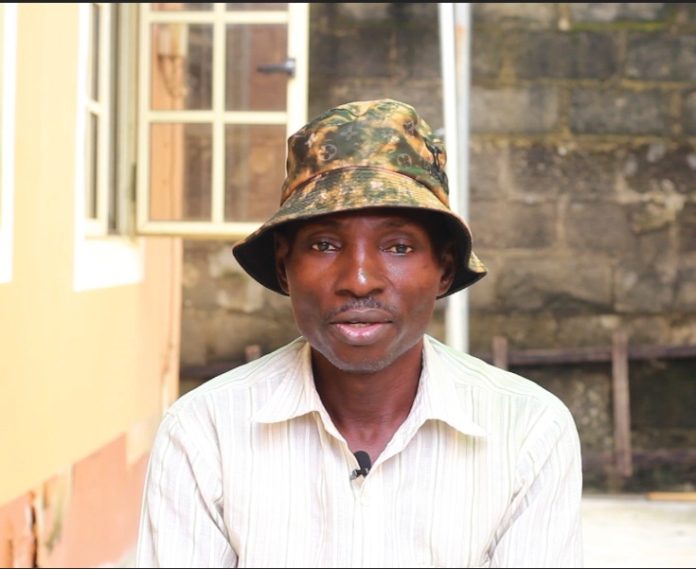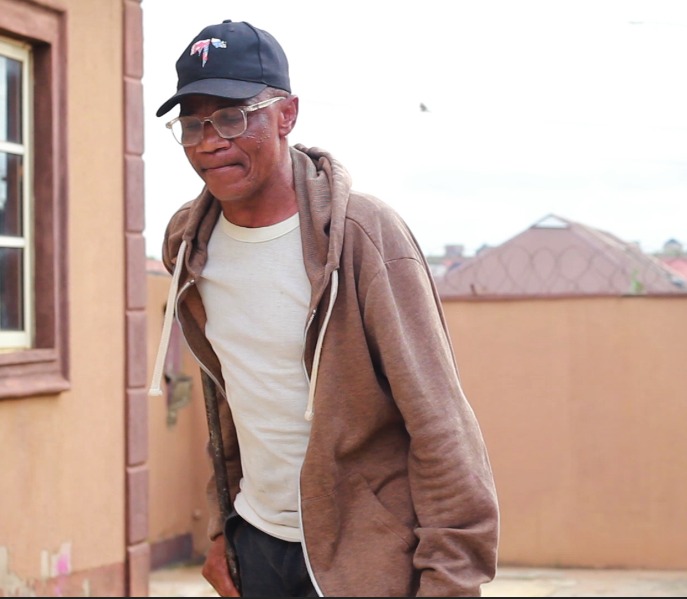By Henry Okonkwo
Anyone seeing Mr Abiodun Mustafa limping on one leg with the assistance of an old wooden crutch could be tempted to tag him as an old haggard beggar trudging off to beg for charity at bus stops. Nothing suggests that Mr Mustafa is one of the numerous heroes who shed their blood, sweat, and tears for Democracy Day, which Nigeria commemorates today.
Comrade Mustafa who also is known as ‘June 12’, was among those that staked their lives to challenge and call for an end to military rule, and the reinstatement of the aborted mandate of the winner of the June 12 1993 presidential election, late Chief MKO Abiola. Their bravery and protests irked the ruling junta, who unleashed soldiers and police with marching orders to crush the dissenting voices. But their continued defiance finally pressured the military to enthrone democracy in May 1999.
During that struggle, many activists, journalists, students, grassroots mobilisers and even ordinary Nigerians, were marked for annihilation, assassination, arrest and torture. Thus, many innocent Nigerians were killed, and several others were severely injured. And even today, many of these victims have become permanently deformed, while some still nurse physical and emotional pains from the injuries they suffered from those onslaughts three decades ago.
In a normal setting, heroes like Mustafa that fought and bled for a better society are revered and appreciated by the people and government. They are not only given pride of place in the annals of history but they are also rewarded for the sacrifice they made for their fatherland. Sadly, this is not the situation for the many surviving heroes of Nigeria’s democracy. Many of the heroes have been forgotten, overshadowed by the more prominent figures who led the struggle. They are unsung, gradually fading in the psyche of Nigerians, and abandoned to wallow in penury.
When the AF24NEWS crew visited Mustafa at his home in Oyeleke Street, in the Gbenaje area in Alaso part of Lagos State, he painted a sorry picture of his life during and after the June 12 struggle. According to 59-year-old Mustafa, he was a thriving tailor until he lost his right leg after he was shot at close range by soldiers during a protest against military dictatorship with the likes of the late Gani Fawehinmi. And although he is thankful for surviving the murderous attacks, losing a limb changed the entire course of his life. Presently, this June 12 hero said he is broke, broken, homeless and on the verge of becoming hopeless. Pathetic.
“I am a very sad man,” he said. “I am an example of how not to treat people that risked their lives for a better society. Since, after I lost my leg during the June 12 struggle, it has been hard to feed my family. When we finally attained democracy in 1999, the state governors of Lagos, promised to appreciate us by empowering us – the unsung heroes of the June 12 struggle, but since then nothing tangible was done to actualise that promise. I have been struggling to cope with my family. And right now, I am sad to admit that I and my family could be evicted from this house we’re living in because of my inability to pay the rent. I’ve been issued a quit notice directing me to pack out in a few months. I am really not happy, because I feel Nigerians have forgotten in the hurry the costly price many of us paid to attain the democracy everybody is enjoying now.
“I was a thriving tailor. And I used to make clothes for Dr Beko Ransom Kuti, he was the one that brought me into human rights activism. He used to take me to the National Democratic Coalition (NADECO) meetings back then. I lost my leg during a rally we held after the annulment of the June 12 election.
“It happened precisely on July 6, 1993. I was involved in a peaceful protest with the likes of the late Dr Joe Odumakin, the late Gani Fawehinmi, Chief Femi Falana, and others. We marched from Chief MKO Abiola’s House to Onipanu through the National Stadium to Alaka. We had just left Festac House when soldiers waylaid us and started shooting at us at close range. Many people were killed. And I was hit on my right leg. I almost bled to death, but Dr Beko was quick to save me. He put a call to General Diya who sent his men to rescue me. I and about six others were rushed to the General Hospital in Island.
“I was there for two days till the hospital officials advised me to escape because they got a wind that soldiers would be raiding their hospital to capture and kill every survivor. And true to their warning the soldiers raided the hospital. The medical staff locked the hospital, abandoned us in our wards and ran for their lives. I managed to drag myself out of my bed, crawled and hid quietly in a dark corner inside the ward. Other victims that were too weak to escape were all shot dead by the soldiers.
“I laid quietly, enduring the agonising pains I felt in my leg, till I was able to establish contact with my family in Ilorin. They then came and took me to the University Teaching Hospital, Ilorin. My leg was amputated because my condition was already critical and there was nothing else the doctors could do. They said the bullet wound had become infected because it was left for days without proper medical attention.
“It is sad how we’re being treated after the sacrifice we made to enthrone democracy in Nigeria. We deserve better treatment because we’re no longer just victims of June 12, we’re actually victims of present Nigeria’s democracy,” he said.
Other unsung June 12 heroes are Comrade Toyin Okanlawon and Akinola Orishagbemi. Comrade Okanlawon was also shot in the leg when he joined the students’ protests at the Obafemi Awolowo University, Ile-Ife. And according to him, he still feels excruciating pains and has been going in and out of different surgeries on the leg. Also, Orishagbemi – a personal assistant to the late Kudirat Abiola survived by the skin of the teeth after 16 bullets lodged in his back while protesting the arraignment of MKO Abiola at the court in Abuja. And till today, he still suffers mental and psychological trauma from that experience.
According to them, they have no regret risking their lives in the fight for justice, and to enthrone democracy. They said that they see their scars and deformity as badges of loyalty and love for their country.
Comrade Toyin Okanlawon who was shot in the leg when he led students to protest at OAU, Ile-Ife in 1998 is still in pain as he has had over 12 surgeries on his leg to ensure it does not get infected, and lead to amputation.
He said, “I protested twice in 1993 and 1998. In 1993, when the election was annulled we protested at the old Onipanu pedestrian bridge, Fadeyi and Palm Groove. I witnessed how soldiers were shooting protesters from a helicopter hovering above the protesters. I saw one person hit by a bullet before the crowd dispersed. Later, when I gained admission to the Obafemi Awolowo University, I was part of the student union movements.
“On 9th July 1998 when news of MKO Abiola’s death hit the streets, the students’ unions held a peaceful rally to honour the late Chief MKO Abiola. The student unions along with other activists and political groups allied and staged a peaceful protest of which the police were part of the rally. But as we moved to the campus gate moving towards Mayfair, the police suddenly turned at us and opened fire. They shot sporadically with their AK47 rifles; we were over 24, 000 students that were at the rally. I was shot in the femur. Other students like Abayomi Igbekoyi and Muritala Popoola were also shot. Muritala was shot in the private part and he died three weeks after at the Obafemi Awolowo University Teaching Hospital Complex (OAUTHC). Too many students were injured.
“After I was shot, I was picked up by the policemen who drove me to Moore Area Command at Ile-Ife, where I was detained, brutalised and bestialised. They called me names and spat on me. I was tortured for more than six hours and was left to die before students intervened and rushed me to OAUTHC. Since then I have been nursing the pains and have had over 12 major surgeries to keep the leg from deteriorating”.
Comrade Orishagbemi on his part joined NADECO in his 20s, and was the youngest in the group back then. “Our struggle for justice started in 1994 when we went out to call for the declaration of Chief MKO as the president of Nigeria. The military came down on us and arrested MKO soon after his declaration at Epetedo. We kept on protesting even though we knew soldiers would come for us, but we cared less. They labelled MKO a coup plotter and then moved him to Abuja. We continued to protest insisting that the government should move the case back to Lagos. So on July 14, 1994, I was shot at and 16 pellets were lodged in my back. I was taken to a hospital in Abuja and was admitted there for four weeks after which I was moved to another hospital in Lagos where I stayed for over five months.
“Many had wanted to erase the June 12 struggle from Nigeria’s history but thank God it has now been given national recognition,” Orishagbemi said.


























